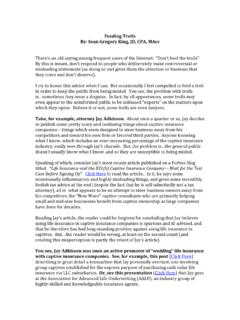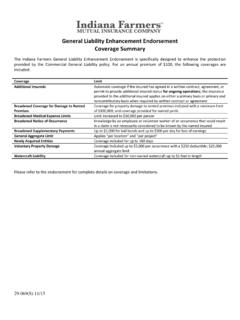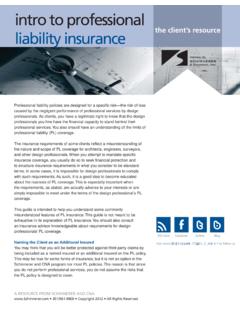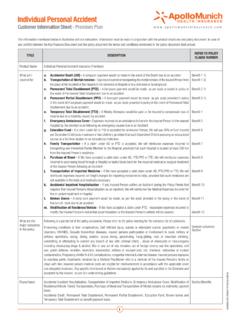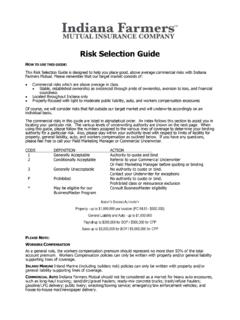Transcription of Self Procurement Captive Premium Taxes NRRA …
1 1 self Procurement Captive Premium Taxes nrra Impact and Navigating this Confusing Area of Captive Taxation Compliance Thomas A. Cifelli, Captive Experts, LLC, May 2013 Introduction Even though most US states now license Captive insurance companies, most captives continue being formed in states other than the home state of the insured companies for non-tax business and economic reasons. As a result the Captive is a non-admitted insured in the state where the risks are located, raising the issue as to whether the Captive or insureds are subject to self - Procurement retaliatory Premium Taxes or not.
2 This article discusses the limits to a US state s jurisdiction to tax premiums, and predicts how this confusing compliance area impacting Captive insurance will eventually be resolved within the US. Every state has differing laws to consider in this increasingly confusing compliance area. Background Before the governmental entity known as the United States was formed, North America was governed by several independent states. When the states unionized, they contributed some governing power over to a central body known as the Federal government, and retained certain powers.
3 One of the powers partially released and partially retained by the states is the power to tax. While this occurred hundreds of years ago, the question still remains today concerning exactly how much of this power to tax did the states transfer, how much did they retain, and how far can a state extend its taxing power onto businesses without offices or employees in that state. The Due Process Clause and Commerce Clause of the US Constitution are the most often cited legal sources bearing on the issue. In 1897, the United States Supreme Court ruled that a citizen of a state has the inalienable right under the due process clause of the Fourteenth Amendment of the Constitution to contract for insurance with an unlicensed carrier so long as the contract is concluded outside of the state.
4 Case law is discussed in more detail below, but this general principal of constitutional law remains valid today despite some states like Washington taking the position that insureds based in that state may not buy insurance from out of state captives. We believe Washington s position will be held unconstitutional if someone challenges them in federal court. The Dodd-Frank Act state based insurance reform provisions known as nrra provision Title V is an attempt by Congress to simplify compliance with the complex web of state based retaliatory self Procurement Premium tax ( RPT ) statutes.
5 Whether the nrra s language makes it inapplicable to Captive insurance companies is a secondary issue to whether a state can levy a tax on premiums paid to cover risks within the state when the insurance Premium is paid to an insurance company not doing business within the state. RPT Taxes have many names and labels. The US government calls its RPT an excise tax, applied to premiums paid offshore insurance companies. US states use various other names including surplus lines, self -procured, independently procured, non-admitted and industrial insured Taxes . In most cases these Taxes are collected and paid by licensed brokers or insurance companies doing business within a state.
6 Where an out of state Captive writes lines of coverage for affiliated businesses, there is no clear mechanism for determining if and how applicable state self Procurement tax laws apply. This area is one of the largest compliance issues of concern within in the Captive industry today. 2 This self Procurement taxation issue is not just a US federal or US state constitutional tax nexus issue; It is fundamental to the power of any government to fairly tax transactions, and adopt efficient systems to levy and collect such Taxes . The private sector needs to clearly know when these Taxes apply, and who is responsible for collecting and paying them.
7 Sales and Use Tax Analogy The widespread debate among the states about e-commerce eroding state sales tax revenue is helpful in understanding the RPT issue and where it may be going. Amazon s success is partially due to it selling goods without buyers paying state sales Taxes . In the states where Amazon has any physical office or warehouse presence, Amazon has conceded it has the obligation to collect and pay sales Taxes on orders by residents of those states. This physical doing business presence has been the constitutional hallmark of sufficient nexus for a US state to require collection and payment of its Taxes .
8 However a physical presence has not always been required. In Tyler Pipe Industries v. Washington and Scripto v. Carson the out-of-state taxpayer did not actually have offices or employees in the taxing state, but attributional nexus was found based on the in-state activities carried on by affiliates or independent contractors on its behalf. States without a jurisdictional basis for requiring Amazon or other out of state ecommerce companies to collect and pay state sales Taxes are increasingly chasing revenue from the other direction the resident shopper. These states are starting to modify state tax forms to require residents to disclose online shopping and pay use Taxes on purchases from out of state businesses.
9 These types of Taxes are becoming increasingly common in the US as governments explore new non-income tax based transactional revenue sources. They have long been the hallmark of many offshore income tax haven jurisdictions who understand the simplicity and efficiency of transaction based tax systems. Application to Captives - State Specific Examples The Amazon analogy offers great insight into how the RPT issue might ultimately be resolved in the US. Most states have Premium Taxes ranging from 2% to 6% targeting non-admitted insurers selling insurance to resident business and individuals.
10 These RPTs are generally higher than the Premium tax rates charged admitted insurers. While US constitutional court decisions and state statutes protect the right to purchase insurance from non-admitted insurers, when these Taxes apply, who is responsible to pay them, and whether a state can enforce collection are complex issues not always agreed upon. The nrra provisions attempt to help simplify this area for larger companies with a business presence in multiple states who buy from insurance companies not admitted to do business within those states by allowing only the insured s home state to collect RPTs.
